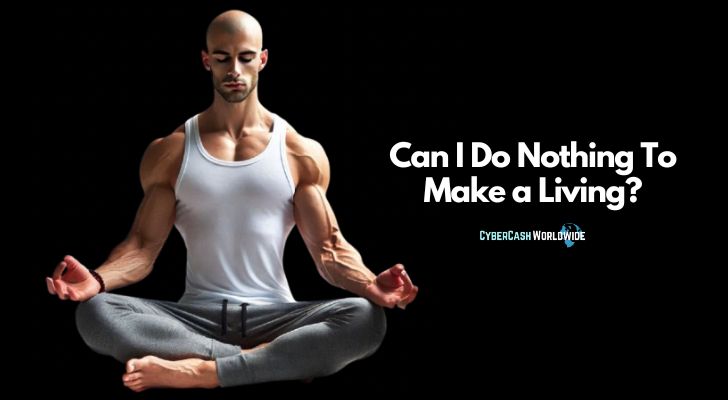The idea of doing absolutely nothing and still making a living may sound absurd at first glance. However, when we step away from conventional thinking and look at the world through a different lens, the notion becomes less far-fetched.
Doing nothing, in its truest sense, involves a state of deliberate non-action—a refusal to actively participate in the grind—while still maintaining the means to sustain life. Let’s explore this concept from a philosophical angle and see how it aligns with practical ways of existing outside the framework of effort and labor.

The Philosophy of Non-Action
Non-action doesn’t equate to laziness or idleness. It’s an intentional withdrawal from the systems of production and effort-driven identity. The idea finds its roots in ancient traditions like Taoism, where non-action, or "wu wei," signifies harmony with the flow of existence. Doing nothing, then, becomes a radical act of resisting the constant drive for productivity.
This philosophy invites reflection on the nature of value and worth. Is one’s existence only meaningful through output? Can value exist in mere being? These questions challenge the norms of transactional living.
Observing the natural world. Plants grow and rivers flow without force or effort, suggesting that existence itself is sufficient.
Stepping away from time structures. Refusing to adhere to calendars and clocks as a form of passive rebellion.
Letting systems collapse. A hands-off stance when faced with societal expectations, allowing the systems around you to adapt or fail without intervention.
Living anonymously. Removing yourself from societal labels or identity markers, becoming invisible within the crowd.
Accepting randomness. Allowing life to unfold without trying to steer outcomes.
This mindset lays the foundation for understanding how doing nothing might still yield the means for survival.
Existing Within Systems While Opting Out
Modern society offers loopholes and mechanisms that can sustain life without active participation. By strategically existing within these systems, one can maintain a livelihood while doing next to nothing. This doesn’t involve exploiting others but recognizing opportunities to exist quietly within the framework.
Receiving a universal basic income (UBI). In regions where UBI exists, it provides a foundation for survival without requiring labor.
Living off inheritances or trusts. Wealth passed down through generations can sustain a minimalist lifestyle.
Government programs. Subsidies, housing allowances, or social benefits designed for survival.
Minimalist living. Adopting a lifestyle that requires very little income by drastically reducing needs and desires.
Bartering or gift economies. Participating in systems that don’t rely on monetary exchange.
These approaches reflect a passive interaction with existing structures, leveraging their mechanisms to maintain life without engaging in traditional work.
The Automation Paradox
In an increasingly automated world, the concept of labor is shifting. Machines and algorithms perform tasks once reserved for human effort. This creates opportunities for passive living, where income generation happens without direct human intervention.
Investing in automated financial systems. Algorithms that trade stocks or cryptocurrencies without manual input.
Creating and licensing intellectual property. Software, patents, or other intellectual assets that generate royalties.
Renting out owned assets. Platforms allow properties, vehicles, or equipment to earn money with minimal interaction.
Letting ads generate revenue. Platforms that host content with ad revenue shared passively.
Subscription-based services. Offering digital products or memberships with minimal upkeep.
Here, technology serves as the interface that performs tasks traditionally requiring human effort, aligning with the philosophy of non-action.

Radical Minimalism and Doing Nothing
Living with less is a form of protest against the labor-driven model of existence. Radical minimalism seeks to remove all unnecessary attachments, allowing one to thrive in a state of non-action. This lifestyle isn’t about deprivation but about intentional simplicity.
Living off the grid. Using solar power, growing food, and relying on natural resources.
Nomadic living. Reducing possessions to what fits in a backpack and wandering without attachments.
Micro-living spaces. Small, self-sufficient homes that require minimal upkeep and expenses.
Dumpster diving or scavenging. Finding sustenance and materials in discarded resources.
Sharing economies. Cooperatives where resources are pooled and shared among participants.
This lifestyle shifts focus from acquiring and doing to merely existing and adapting to what is readily available.
The Ethics of Doing Nothing
Some might question the moral implications of doing nothing. However, stepping back from traditional labor doesn’t necessarily equate to shirking responsibility. It’s an exploration of what it means to exist in harmony with a system without striving to dominate or alter it.
Living symbiotically with the environment. Reducing ecological impact by consuming less.
Relying on voluntary giving. Accepting gifts or help from those who freely offer it.
Practicing reciprocity without obligation. Offering what is easily available without expectation.
Seeking spiritual alignment. Adopting philosophies that prioritize existence over effort.
Exploring alternative currencies. Using timebanks or similar systems to exchange non-monetary value.
These perspectives question the deeply ingrained belief that effort equals worth and propose alternative ways to coexist within society.
The Subversive Act of Doing Nothing
In a world that glorifies busyness, doing nothing becomes a radical statement. It questions the structures of capitalism and the relentless pursuit of growth. This subversion isn’t about disengaging entirely but about reimagining the possibilities of existence outside the framework of effort.
Declining to participate in the rat race. Refusing promotions or roles that demand more effort.
Practicing passive resistance. Non-participation in systems that demand compliance.
Living on the fringes. Choosing lifestyles that are outside mainstream expectations.
Engaging in stillness. Prioritizing moments of complete inactivity as acts of defiance.
Cultivating invisibility. Reducing your digital and physical footprint to escape scrutiny.
By rethinking what it means to do nothing, we open up avenues for living that challenge the norms of productivity and effort.
Non-Consumption as a Way of Living
Choosing not to consume can be as powerful as choosing not to produce. By stepping away from the cycle of constant consumption, one can redefine existence in ways that demand little to no effort. Non-consumption becomes an act of opting out, where doing less becomes a means of survival.
Growing food from scraps. Using kitchen waste to cultivate new plants instead of purchasing groceries.
Making items last. Extending the life of clothing, electronics, and other possessions through careful maintenance.
Avoiding subscriptions. Cutting ties with recurring payments that drain resources over time.
Trading for necessities. Engaging in direct exchanges of items or services without engaging in consumer markets.
Borrowing instead of owning. Utilizing shared or communal resources without needing to acquire your own.
By reducing dependency on markets, non-consumption aligns with the philosophy of doing nothing, turning absence into a strategy.
Reclaiming Time as Wealth
Time is often undervalued in societies obsessed with productivity. Reclaiming time by choosing to do nothing can be seen as a form of wealth, where freedom from obligation replaces material accumulation. This shift challenges traditional views of success.
Meditating without goals. Sitting in silence as an act of reclaiming moments from the chaos of modern life.
Watching the world. Spending hours observing nature or human activity without engaging in it.
Living slowly. Extending activities, such as eating or walking, to savor time instead of rushing.
Prioritizing sleep. Treating rest as a valuable resource rather than an inconvenience.
Allowing boredom. Embracing moments without stimulation or distraction as meaningful experiences.
This redefinition of wealth moves away from tangible assets and reframes life around the richness of time itself.
Doing nothing to make a living is less about a literal absence of action and more about redefining what action means. It’s a philosophical stance, a practical reality, and a quiet rebellion against the systems that demand unending labor. While it may not suit everyone, for those drawn to this way of life, the possibilities are as expansive as the refusal to conform.

